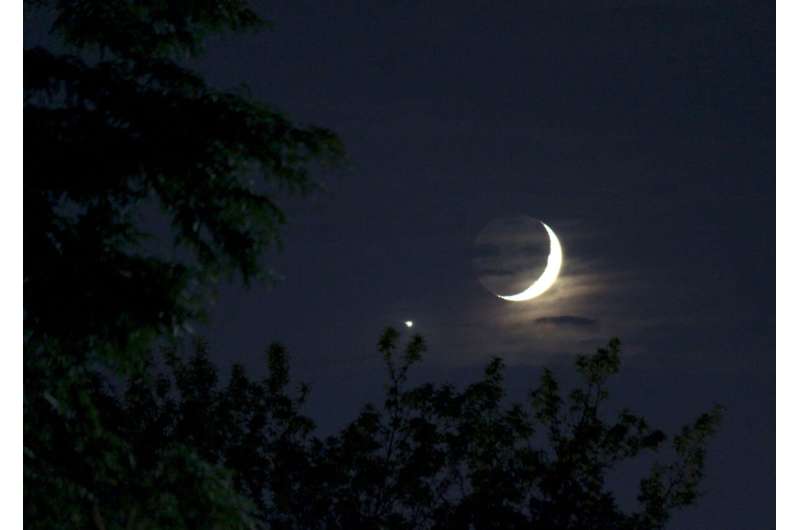Sequence of images from the Dynamic Solar Observatory in wavelength 171 of the transit of Venus, merged to show the path of Venus across the sun. Credit: NASA/SDO
Without Venus’ dense and fast-moving atmosphere, Earth’s sister planet probably wouldn’t spin. Instead, Venus would be locked in place, always facing the sun like the same side of the moon always faces Earth.
The gravity of a large object in space can prevent a smaller object from rotating, a phenomenon called tidal lock. Because it prevents this lock-in, a UC Riverside scientist argues that the atmosphere needs to be a bigger factor in studies of Venus as well as other planets.
Those arguments, along with descriptions of Venus as a partially tidally blocked planet, were published today in a natural astronomy article.
“We think of the atmosphere as a thin, almost separate layer above a planet that has minimal interaction with the solid planet,” said Stephen Kane, UCR astrophysicist and lead author of the paper. “Venus’ powerful atmosphere teaches us that it’s a much more integrated part of the planet that affects absolutely everything, even the rotational speed of the planet.”
Venus takes 243 Earth days to rotate once, but its atmosphere circulates the planet every four days. Extremely fast winds drag the atmosphere along the planet’s surface as it circulates, slowing its rotation while loosening the grip of the sun’s gravity.
Slow rotation in turn has dramatic consequences for the sweltering Venusian climate, with average temperatures of up to 900 degrees Fahrenheit, hot enough to melt lead.
“It’s incredibly alien, a very different experience than being on Earth,” Kane said. “Standing on the surface of Venus would be like standing on the bottom of a very hot ocean. You couldn’t breathe on it.”
One reason for the heat is that nearly all of the solar energy absorbed by the planet is absorbed by Venus’ atmosphere, never reaching the surface. This means that a rover with solar panels like the one sent by NASA to Mars would not work.

Bright Venus seen near the crescent moon. Credit: NASA/Bill Dunford
The Venusian atmosphere also prevents the sun’s energy from leaving the planet, preventing cooling or liquid water on its surface, a condition known as the runaway greenhouse effect.
It’s unclear whether being partially tidally locked contributes to this runaway greenhouse state, a condition that ultimately renders a planet uninhabitable by life as we know it.
Not only is clarifying this question important for understanding Venus, but it’s important for studying exoplanets that may be targeted for future NASA missions.
Most of the planets likely to be observed with the recently launched James Webb Space Telescope are very close to their stars, even closer than Venus is to the sun. Therefore, they are also susceptible to tidal lock.
Since humans may never be able to visit exoplanets in person, it is essential to ensure that computer models account for the effects of tidal locking. “Venus is our opportunity to correct these models, so that we can properly understand the surface environments of planets around other stars,” Kane said.
“We’re not doing a good job of considering that right now. We’re mostly using Earth-like models to interpret the properties of exoplanets. Venus is waving both arms saying, ‘Look over here! “”
Gaining insight into the factors that contributed to a runaway greenhouse state on Venus, Earth’s closest planetary neighbor, can also help improve models of what might one day happen to Earth’s climate.
“Ultimately, my motivation in studying Venus is to better understand Earth,” Kane said.
How the Webb Telescope could ultimately help protect Earth
Atmospheric dynamics of an almost tidally locked Earth-sized planet, natural astronomy (2022). DOI: 10.1038/s41550-022-01626-x
Provided by University of California – Riverside
Quote: Why Venus Rotates, Slowly, Despite the Sun’s Powerful Grip: The Planet’s Atmosphere Explains the Seriousness of the Situation (April 20, 2022) Retrieved April 20, 2022 from https://phys.org/news/2022-04 -venus-rotates-slowly-sun-powerful.html
This document is subject to copyright. Except for fair use for purposes of private study or research, no part may be reproduced without written permission. The content is provided for information only.
 Universo Viviente
Universo Viviente



